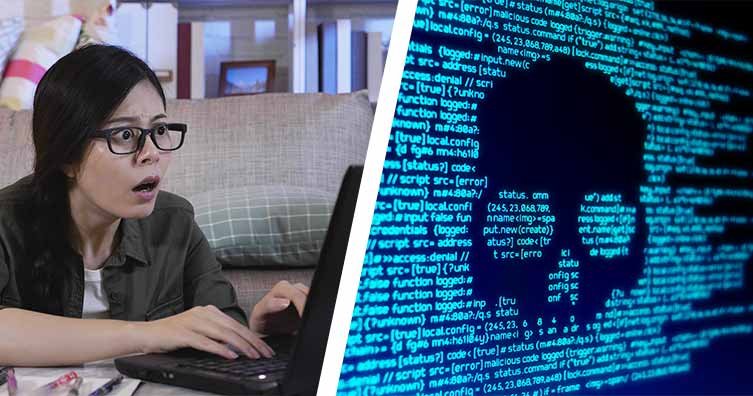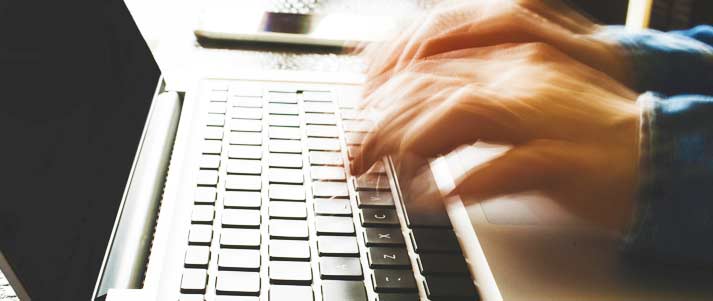
Concerned that computer pirates have access to their email, social networks or bank accounts? Follow these simple steps to complete online safety and tranquility.

Credit: (left) PRPICTURESPRODTION, (RIGHT) SOLLING, – – Shuttersock
Most of us like to think that we are quite expert in technology, but research has shown that around 60% of people use the same password In multiple accounts.
This means that a Facebook hacker could also get access to your smartphone, file storage online, email, Amazon account, smart TV, Google Maps history, social networks and basically your life.
Unfortunately, there is only one dead certificate of avoiding being pirate: Never enter line. But if you do not feel like living under a rock for the rest of your life, we have the essential advice to keep one step ahead of the cybercriminals here.
Before entering our main advice on how to avoid piracy, let’s review the basics quickly. If you get this, you are already drastically reducing your chances of committing yourself without having to put a lot of work.
How to avoid being pirate: the basics
Start with Marc Goodman’s ‘UPDATE‘acronym – then take it to the next level with our 33 tips below.
- ORPdate regularly – Automatically use updates to obtain the last patches for applications, software and operating systems.
- PAsswords: Don’t reuse them – Using the same password at multiple session is a rookie error. Once the computer pirates get a password, they will try it in everything they can connect.
- DOwnload of authorized sources – Whether ‘loading’ (self -installation) applications or choosing open source software, be sure to get them from trusted sites. Verify if there are grouped bits (‘spyware’ or ‘adware’) and eliminate them, tool bars and accessories that change their predetermined search engines are the largest culprits.
- ‘TOD -administrator ‘should not be its default configuration – Do not log in as a computer administrator for daily use (except when necessary, as if you are installing things). If you download something doubtful or have already committed, computer pirates can track, install and change what you want.
- TUrn out when it’s over – That includes closing the session outside the sites when it has been filled with memes, turning off the computer when it leaves the house or disconnecting the wifi when I do not use it.
- myNCRYPT to maintain your illegible things – The encryption does not stop files, emails or details that it sends through a website to be intercepted: ‘stir’ the content so that unauthorized users cannot read them. Always verify the small padlock symbol next to the URL (or that the address begins with HTTPsnot only HTTP) when you log in or provide payment details. Filevault (integrated into Mac) can help, like free public services such as Veracrypt.
33 tips on how to avoid being pirated

Credit: Bezov Atanas – Shuttersock
Protecting from being pirated can take only a few minutes with these fast steps:
- Get a decent antivirus and firewall software and light it! Some insurance and banks only cover fraud and robbery if you can demonstrate that you had security in your place.
- Important data backup in a hard drive either USB stick. If there is something that would be destroyed to lose, keep copies.
- Be demanding about which companies share their personal information: their data Just as safe as they are.
- Suspect a lot about emails or messages requesting login or account information, and verify that any link is legitimate (that is, No HSBO-BANK.co.uk) and insurance (HTTPs no HTTP). These are known as phishing scams and are one of the easiest ways to steal passwords.
- Most cloud storage can be snapped. Cifre the content you keep in them or see Dropbox (which claims to encrypt all stored files).
- Just log in to accounts of Your own gadgets. If you have to use a public or shared device, make sure close session later.
- Whenever possible, buy online using a credit card. If you are a victim of fraud, you will have a better opportunity to recover your money. If it cannot be accepted for a credit card, use a prepaid card, although this will not ensure their stolen cash, computer pirates will only have access to what they have overcome instead of the entire bank balance.
- If there is something that really, you really don’t want anyone else to know or get, don’t put it online!
- When it comes to passwords, use a Unusual but memorable phraseand replace letters with numbers or punctuation marks (zero instead of O, or 3 for e).
- Never use real answers in security questions – Form memorable answers That will only make sense to you.
- Change passwords at least A couple of times a year. Get the fresh and not only change the ones you already use.
- Get the last step, seriously. Everything is very good (and essential) with long and unique passwords for each site, but will never remember them without a password administrator. Lastpass is the most popular free solution to store them all and is easily integrated as an extension of the browser (and application).
- Use two -step verification If available for session. If someone logues from a new or unauthorized device, you will have to provide a code that is only sent to your phone or email address.
- Do not use an easily guessed email, such as yourname@gmail.com, to log in to sites that contain confidential information (such as online banking). Use alias electronic emails that can simply forward your main account.
- In fact, use alias electronic emails to All aspects of your life online: work, personal things, payments, memes, whatever. This will limit what information the hackers can access (and how much spam obtains).
- Forced to enter an email address, but are you worried about being flooded with spam later? Use one that you can burn when you have finished! You can create a temporary email that is combusted after use in Guerrillamail.com.
- If your email account shows the location of the last login (Gmail does: verify the bottom of the screen), check out from time to time to detect any dishonest use.
- Check you Privacy configuration in social networks. Non -transmits all updates to the entire world. Log in from time to time to see your profile of the way strangers see it.
- Do not accept friendship requests from people you don’t know.
- Allow Login alerts Pitte when someone signs in their social media accounts. On Facebook, you can activate it through safety configuration (approve your own devices so you don’t receive meaningless alerts).
- Be careful what you share in the social, especially your date of birth or any information that banks use to verify lost accounts or passwords.
- Check the application permissions. Every time you log in somewhere else using Facebook or add an application to your account, you have opened another door for a personal data leak. See what information you are delivering.
- Always block your phone with the recognition of digital footprints, a safe pin (not your birthday) or a unique gesture.
- Know Clean your gadgets If they are lost or stolen.
- Put a sticker on any unused webcam (computer pirates could be looking at you).
- Read the application permissions to see exactly what data are allowing access Before installing them.
- Install Find my iPhone (Apple) or be sure to configure Find my device In Android. Prey It is also excellent for tracking, blocking and cleaning of missing portable phones and computers.
- Always protect the password of your starting Wi -Fi network and change the predetermined administrator password in your Internet routers. Ensuring that your Wi -Fi is protected with password is also a good way to improve your broadband speed.
- Use a VPN (Virtual Private Network) to ‘cover up’ you and your data. NORDVPN or private Internet access are our favorites due to the ease of configuration, privacy settings and security characteristics.
- Remember that the public wifi has more holes than Swiss cheese. Everything you do while connected can be spyed. Using a VPN can help.
- Use only well -known Wi -Fi points or good reputation – Configure free free networks is a common bite.
- Turn off sharingso that the things that usually connect or share on a safe network (files, devices or session) are not discovered.
- Just visit safe sites: Check the lock and ‘https‘In the address bar.
What to do if you think you have been pirate
If you have been pirate, keep calm and do the following:
- Tell relevant people: their bank, the police and any site involved.
- Change their passwords, including anyone who believes that thieves could arrive, not only for compromised accounts.
- Warn personal contacts that you have been pirate.
- Consider Clean data remotely If your device is stolen. To do this, go to Icloud for apple or Google finds my device For Android.
- Locate your devices if you can (see Tip 27) But don’t look for them yourself! Tell the authorities.
While increasing your security settings, why not download these essential applications that each student needs?


![20 best LSE executive education programs [2025 September] » Free Courses 20 best LSE executive education programs [2025 September]](https://moumentec.com/wp-content/uploads/2025/09/20-best-LSE-executive-education-programs-2025-September-220x150.jpg)


